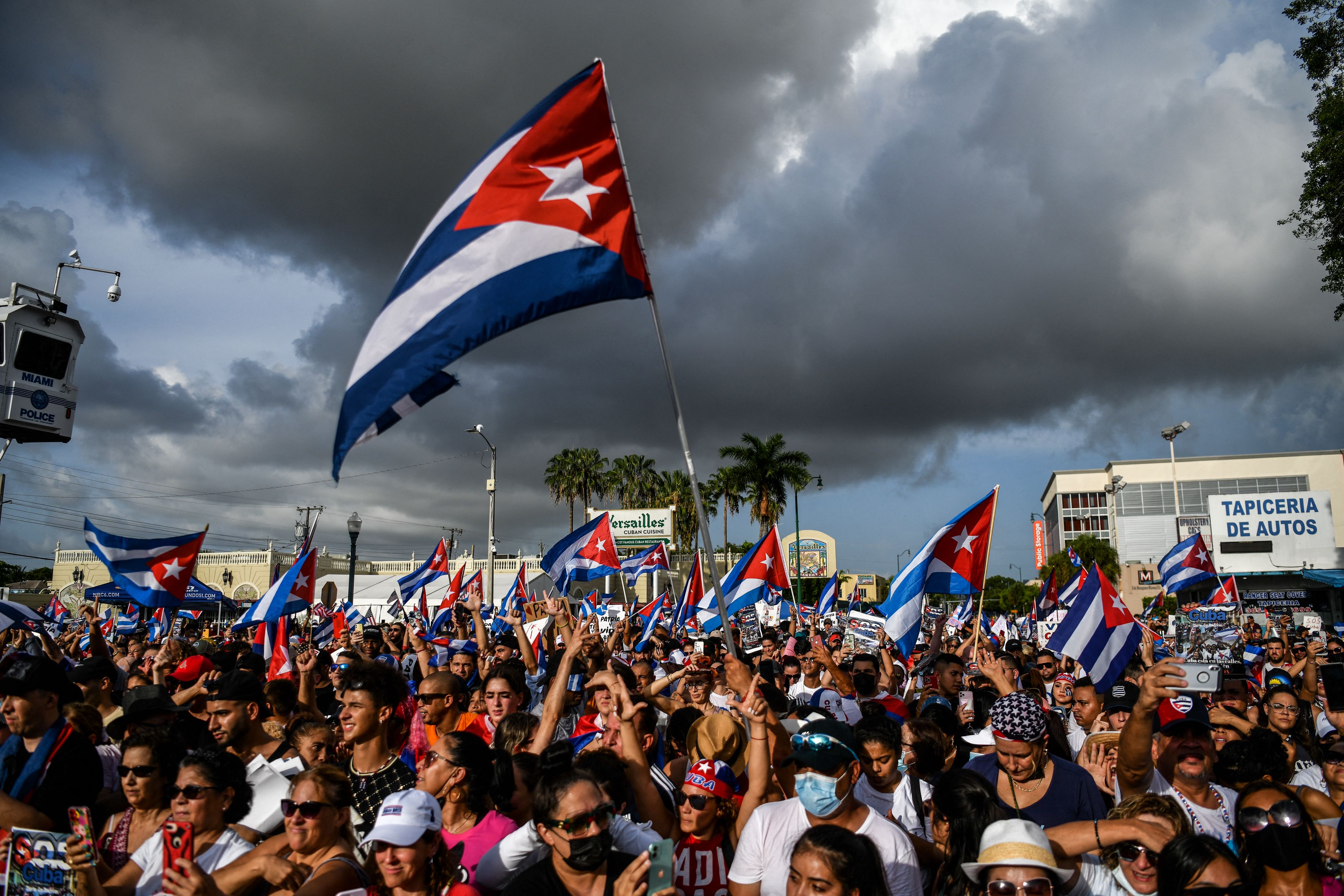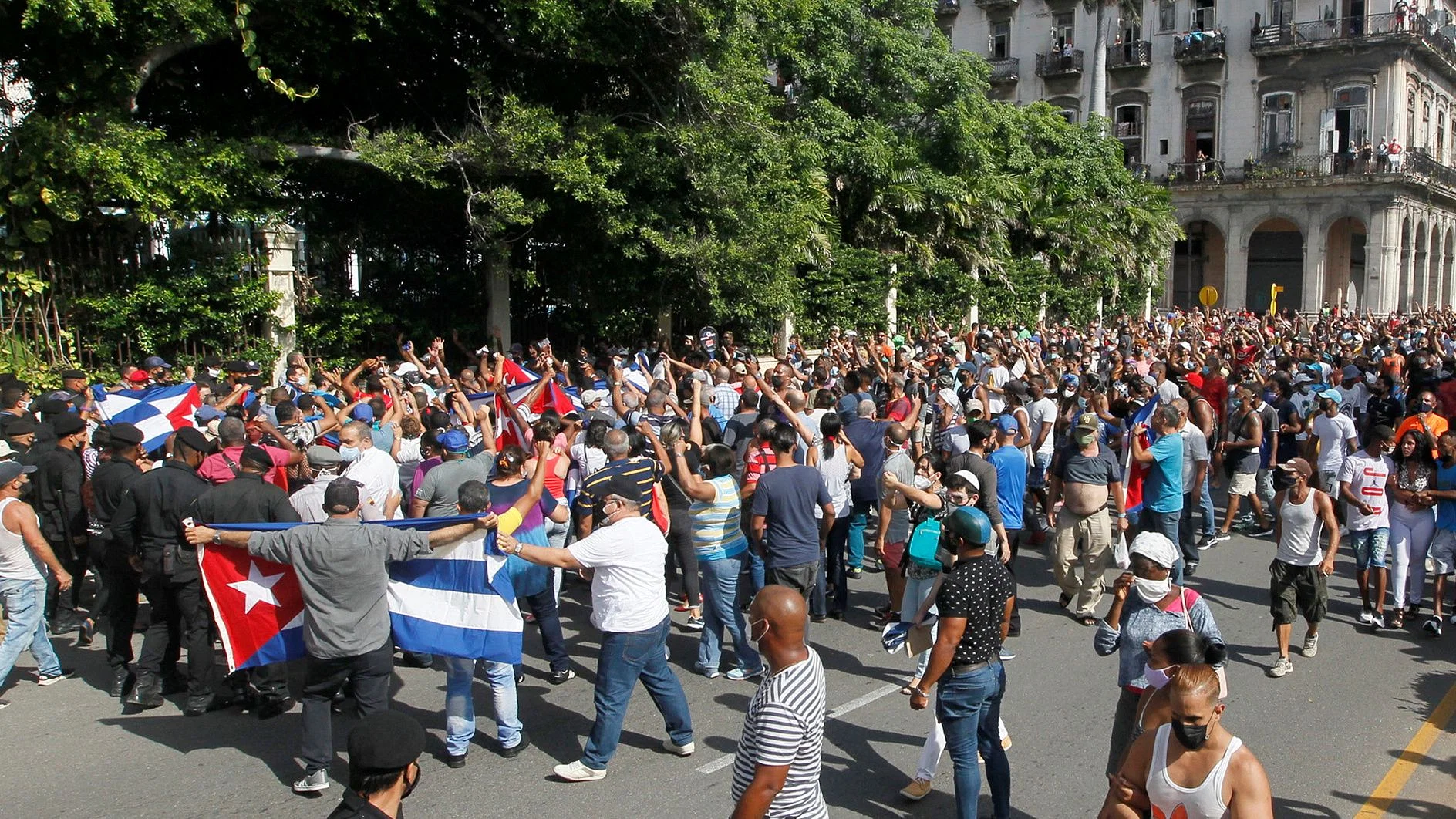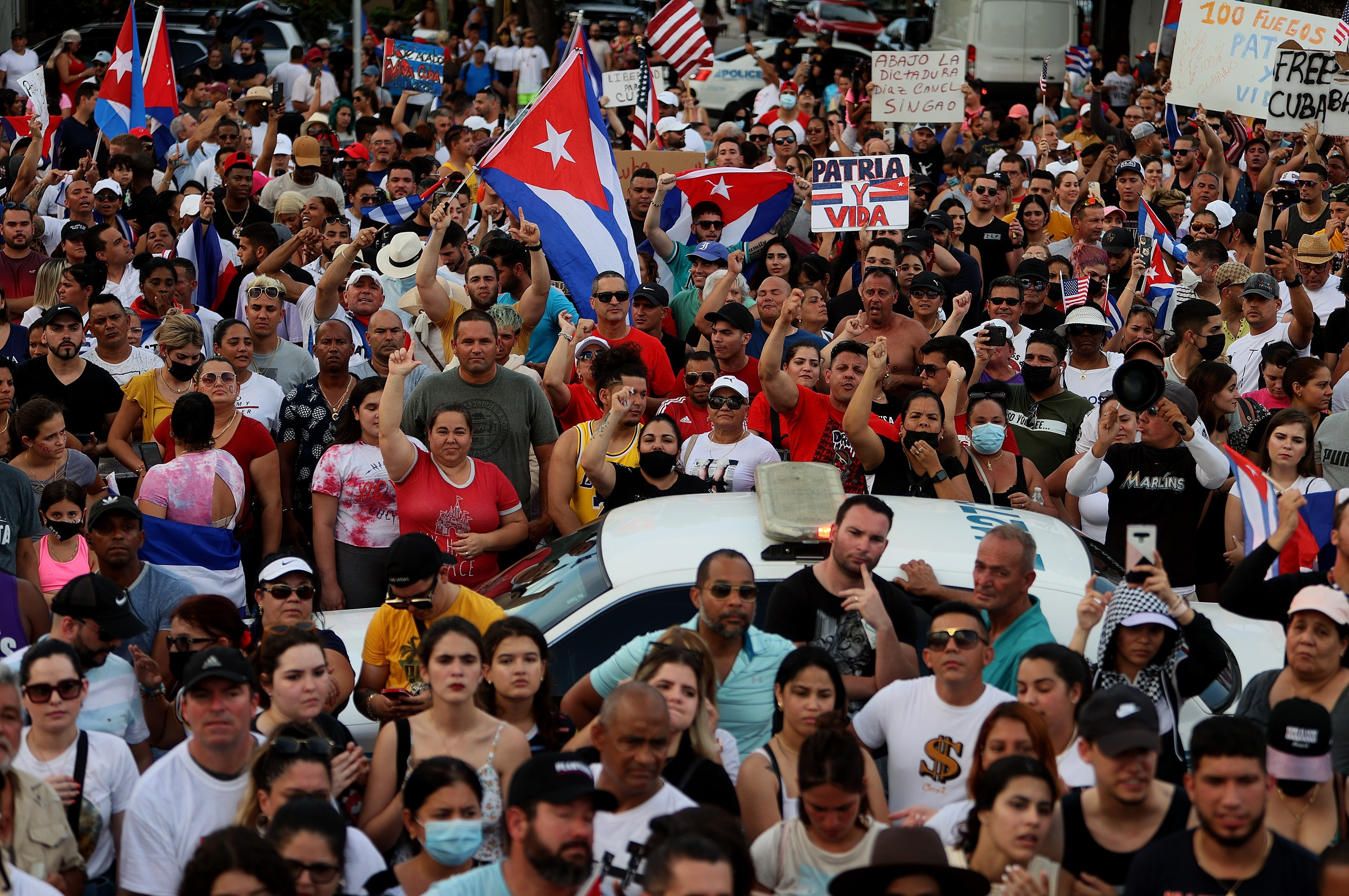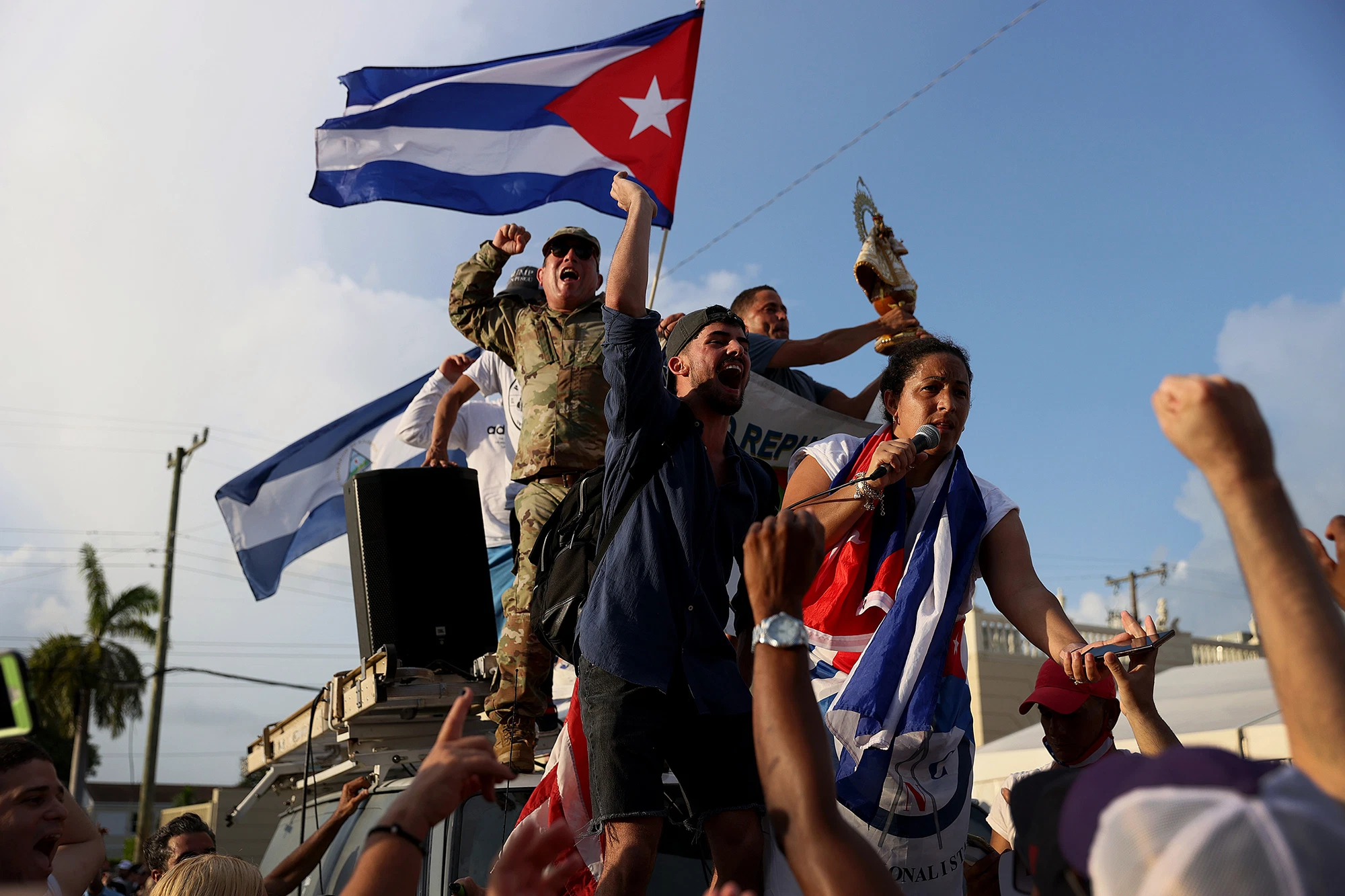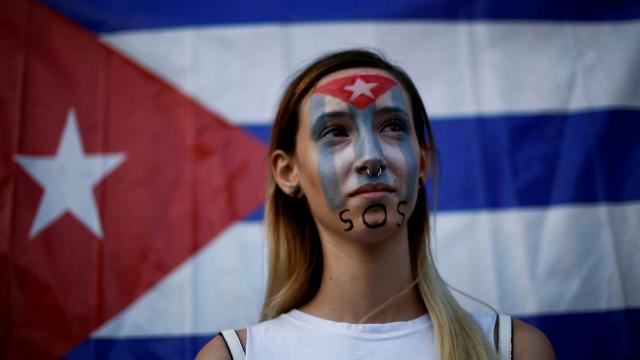
Una versión Español de este artículo aparece debajo de la versión original. (A Spanish language version of this article appears below the original version.)
Traducción Español de Lola Ellis. (Spanish translation by Lola Ellis.)
For several days, thousands of Cubans have been marching in the streets of Havana, protesting a lack of food and medicine and the rapid spread of Covid-19 throughout the island. Readers of US-based, corporate-owned media outlets might think the protests are against “the communist regime,” and President Joe Biden has attributed the protests to “decades of repression and economic suffering” brought on by “Cuba’s authoritarian regime.” While Cuba’s suffering is very real and the Cuban people are right to protest, the island nation’s economic and health crises can actually be directly attributed to the strict, 60-year-old trade embargo the US has continued to impose on Cuba.
The embargo first put in place by President John F. Kennedy in 1962, and the terrorist designation imposed by President Ronald Reagan in 1982, were both lifted by President Barack Obama in 2015, only to be re-established by President Donald Trump not long after he took office in 2017. As of this writing, President Biden still has not lifted Trump-era restrictions on Cuba, even in spite of all but nine members of the United Nations voting to condemn the embargo in June. The continued sanctions have made buying food particularly costly, leading to the food shortages that have spurred the recent wave of protests.
Given the US’ close proximity to Cuba, the Caribbean island nation depends on the United States for its food. In 2020 alone, the Congressional Research Service estimated that Cuba imported more than $150 million worth of agricultural products from the US. According to Cuban President Miguel Dìaz-Canel, approximately two million foreign exchange earnings are needed to buy food, which makes it cost-prohibitive to feed the island’s inhabitants with US-based imports. The US government began requiring pre-payments for food shipments to Cuba in 2005, which farming groups said at the time were “contrary to the norms of international trade.”
Cuba’s Covid-19 surge is also a byproduct of the US trade blockade, not the government-run healthcare system. Despite the embargo, the communist nation’s healthcare system was lauded in 2015 by The Lancet, one of the world’s most prestigious medical journals.
“Although the embargo has had severe consequences for many sectors of Cuban life, such as infrastructures and technologies, health has been a success,” The Lancet wrote. “Cuba’s health system has been able to solve some issues other countries have not. The Cuban health system, which is free and firmly anchored in disease prevention and primary care, provides good health outcomes at a cost within the reach of most middle-income countries.”
Cuba also established itself as a leader in the global response to the Covid-19 pandemic. In addition to producing its own vaccine, Cuba also dispatched dozens of its doctors in 2020 to approximately 40 different countries on five continents to help under-developed populations contain the spread of the virus.
The recent surge in new Covid-19 cases is almost certainly exacerbated by a syringe shortage resulting from the US trade embargo. Even though two million of the island’s 11 million citizens have already been vaccinated, a lack of syringes is making it impossible for the Cuban government to inoculate the remainder of the population. Global Health Partners estimates that Cuba needs 30 million syringes to finish the job, though the country is still roughly 20 million syringes short of that goal.
Given that lifting the trade embargo would seemingly solve the issues behind the wave of protests in Cuba, the US’ apparent lack of interest in doing so could be attributed to its decades-long goal of destabilizing the communist government in order to foment regime change through hardship and suffering. In 1960, US State Department official Lester Mallory wrote that “every possible means should be undertaken promptly to weaken the economic life of Cuba.”
“If such a policy is adopted, it should be the result of a positive decision which would call forth a line of action which, while as adroit and inconspicuous as possible, makes the greatest inroads in denying money and supplies to Cuba, to decrease monetary and real wages, to bring about hunger, desperation, and overthrow of government,” Mallory wrote.
This anti-Cuba mindset continues today, with bipartisan support. State Department appropriations bills from both 2019 and 2020 allocated tens of millions of dollars to “democracy programs” in Cuba. Notably, Section 7007 of the 2020 legislation expressly stated that “none of the funds appropriated or otherwise made available” will go to the Cuban government, including “direct loans, credits, insurance and guarantees of the Export-Import Bank or its agents.” This suggests that Congress specifically allocated these funds to support efforts to destabilize Cuba.
The United States’ contribution to Cuba’s suffering has not gone unnoticed by its neighbors. Mexican President Andrés Manuel López Obrador recently called on the Biden administration to lift US sanctions on Cuba and end the blockade.
“No country of the world should be under siege, blockaded. That is the most contrary thing you can do against human rights,” Obrador said. “You cannot create a siege to isolate an entire people, not for political reasons or any other reason. No one can, no one has the right to take those decisions that affect the people.”
Even though former President Trump reinstated the trade embargo, President Biden controls the State Department, and his party controls both chambers of Congress. The 243 separate measures the Trump administration imposed on Cuba still remain in place nearly six months after Biden took office. The only thing that currently stands in the way of help for the Cuban people is political will.
Carl Gibson is a freelance journalist and columnist whose work has been published in CNN, The Guardian, The Washington Post, The Houston Chronicle, Barron’s, Business Insider, The Independent, and NPR, among others. Follow him on Twitter @crgibs.
-----------------------------------------------------------------------------------------------------
CUBA QUIERE SER LIBRE—NO DEL COMUNISMO, SINO DE LAS SANCIONES DE US
Por varios días, miles de cubanos han estado marchando en las calles de Habana, protestando por la falta de comida y medicina y la acelerada transmisión de COVID-19 alrededor de la isla. Lectores de las noticias basadas en los estados unidos, que son a lo grande controlados y poseídas por corporaciones, puede que piensen que las protestas son contra "el régimen comunista," y el presidente Joe Biden ha atribuido las protestas a "décadas de represión y sufrimiento económico" por causa del "régimen autoritario de Cuba." Mientras el sufrimiento de Cuba es muy real y la gente de Cuba tiene razón en sus protestas, las crisis económicas y de salud que están ocurriendo en la nación isla en actualidad pueden ser directamente atribuidas a el estricto embargo de hace 60 años que los Estados Unidos ha continuado a imponer a Cuba.
El embargo primeramente iniciado por el presidente John F. Kennedy en 1962, y la designación de Cuba como un "Estado patrocinador del terrorismo" impuesto por el presidente Ronald Reagan en 1982, juntos fueron retirado por el presidente Barack Obama en 2015, solamente para ser reinstalados por el presidente Donald Trump en los inicios de su presidencia en 2017. Hasta el momento de lo escrito, el presidente Biden todavía no ha retirado las restricciones ante Cuba de la época de Trump, aun y a pesar de que todos menos nueve miembros de las Naciones Unidas votaron a condemnar el embargo en Junio. Las sanciones continuas han hecho las compras de comida particularmente costosas, creando la escasez de comida que ha espoleado las recientes oleadas de protestas.
Tomando en cuenta la cercana proximidad de los Estados Unidos y Cuba, la nación isla caribeña depende en los Estados Unidos por su comida. El servicio de investigación del congreso de los Estados Unidos (Congressional Research Service), estimó que solo en el año 2020, Cuba importó productos agrícolas de los Estados Unidos valorados en más de $150 millones de dólares. Según el mandarario de Cuba Miguel Díaz-Canel, se necesitan aproximadamente dos millones en ganancias del mercado de divisas para adquirir comida, lo cual hace el costo prohibitivo para alimentar a los habitantes de la isla con importes de los Estados Unidos. El gobierno de los Estados Unidos empezó a requerir prepagos para envíos de comida a Cuba en 2005, los cuales grupos agrícolas dijeron que en esos tiempos eran "contrario a las normas del comercio internacional''.
El surge de COVID-19 en Cuba también es derivado del bloqueo comercial de los Estados Unidos, y no el sistema de cuidado médico de Cuba. A pesar del embargo, el sistema de cuidado médico de la nación comunista fue alabado en 2015 por una de las más prestigiosas revistas medicas, The Lancet.
"Aunque el embargo ha tenido consecuencias severas para muchos sectores de vida Cubana, como infraestructura y tecnologías, salud ha sido un éxito, escribió The Lancet. "El sistema de cuidado médico de Cuba ha podido resolver unos problemas que otros países no han logrado. El sistema de cuidado médico Cubano, el cual es gratuito y firmemente anclado en prevención y cuidado primario, produce buenos resultados de salud a un costo al alcance de la mayoría de países de medio ingreso."
Cuba también se ha establecido como líder en la coordinación mundial para responder a la pandemia de COVID-19. Además de producir su propia vacuna, Cuba tambien envio a docenas de sus doctores en 2020 a aproximadamente 40 diferente países en cinco continentes para ayudar a las poblaciones menos desarrolladas a contener el virus.
El aumento reciente en nuevos casos de COVID-19 es casi definitivamente exacerbado por la escasez de jeringuillas que es resultado del embargo de los Estados Unidos. Aunque dos millones de los 11 millones de ciudadanos de la isla han sido vacunados, la falta de jeringuillas hace imposible que el gobierno de Cuba pueda inocular al resto de la población. Global Health Partners estima que Cuba necesita 30 millones de jeringuillas para terminar con las inoculaciones aunque el país sigue 20 millones de jeringuillas debajo de ese objetivo.
Dado que levantar el embargo, al parecer, resolvería los problemas detrás de las protestas en Cuba, la aparente falta de interés de los Estados Unidos en hacerlo puede ser atribuido a su objetivo desde décadas de desestabilizar el gobierno comunista en orden de fomentar un cambio de régimen a través de necesidad y sufrimiento. En 1960, el oficial del departamento de estado de los Estados Unidos, Lester Mallory escribió que: "Cada medio posible debe ser intentado con prontitud para debilitar la vida económica de Cuba."
Escribió Mallory: "Si semejante política fuera adoptada, debería ser resultado de una decisión positiva cual llamaría al frente una línea de acción que, mientras lo más hábil y discreto que es posible, haría mayores avances en negar dinero y provisiones a Cuba, para disminuir el salario nominal y real, para producir hambre, desesperación y derrocar al gobierno."
Esta mentalidad anti-Cuba sigue hoy en día, con apoyo de los dos partidos políticos. El Departamento de Estado de los Estados Unidos en 2019 y 2020, a través de leyes de Asignaciones, asignó decenas de millones de dólares a "programas democráticos" en Cuba. Notablemente, Sección 7007 de la legislación de 2020 expresamente declara que "ningunos de los fondos apropiados o de otra manera hágase disponible" irán al gobierno Cubano, incluyendo "préstamos directos, créditos, seguros y garantías del banco de exportacion e importacion o de sus agentes." Esto sugiere que el gobierno de los Estados Unidos precisamente asignó los fondos para apoyar esfuerzos a desestabilizar a Cuba.
La contribución de los Estados Unidos al sufrimiento de Cuba no ha pasado sin ser notada por sus vecinos. El presidente Mexicano Andrés Manuel López Obrador recientemente pidió a la administración de Biden que levanten las sanciones contra Cuba y pongan fin al bloqueo.
Obrador dijo: "Ningún país del mundo debe ser cercado, bloqueado; eso es lo más contrario que puede haber a los derechos humanos." Agregó Obrador: "No se puede crear un cerco, aislar a todo un pueblo por razones políticas y por cualquier razón. Nadie puede, nadie tiene derecho de tomar esas decisiones que afectan a los pueblos."
Aunque el ex presidente Trump restableció el embargo comercial, el presidente Biden controla el Departamento de Estado, y su partido político controla las dos cámaras del Congreso. Las 243 medidas separadas que la administración de Trump impuso a Cuba siguen estando en su lugar casi seis meses después de que Biden asumió la presidencia. La única cosa que actualmente se interpone en el camino de ayudar a la gente Cubana es la voluntad política.
Carl Gibson es un periodista independiente y columnista publicado en CNN, The Guardian, The Washington Post, The Houston Chronicle, Barron's, Business Insider, The Independent, y NPR, entre otros. Siguelo en Twitter @crgibs.

